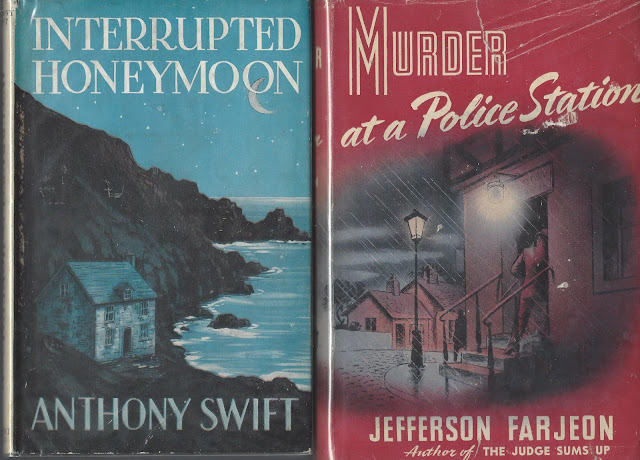The classic Farjeon thriller formula, as I have alluded to before, is for the author to take several individuals and entrap them in an isolated location, where they eventually have to match wits with some crooks with a criminal agenda. His Mystery in White (1937) was perhaps the apex of this formula, which goes back to his debut Ben the Tramp mystery No. 17 (1926). These thrillers usually make entertaining reading, primarily on account of the author's charming writing, but after a bit one does long for Farjeon ro alter his formula. And he actually did so, especially in the late Thirties and Forties.
In 1943 Farjeon introduced a new pen name, Anthony Swift, under which he rapidly wrote three mysteries: Murder at a Police Station (1943), November 5 at Kersea (1944) and Interrupted Honeymoon (1945). The first of these is one of his genuine detective novels and one of his best books. It takes place in the English village of Severing, which has a police force of two: the recently promoted Sergeant Henry Pork and his newly imported constable, who goes by the name of Jones.
One dark and stormy night Sergeant Pork is called out on a case and when he returns to the little station (having found the call was faked), he finds an unknown dead man spawled there! The case, which he solves in one night with the assistance of his farm laborer father Jeremiah, something of a natural genius, manages in its short time to implicate the local gentry and nouveaux riche, a very Scottish Scotsman, a drunken artist, the village shopkeeper and her buxom daughter and a pugnacious farmer named Blythe and his daughter, Mary, in whom Sergeant Prk takes a definite interest (and Vice versa).
It's an immensely enjoyable book, which is resolved through genuine detection. In the United States it was published under Farjeon's own name and quite well reviewed. (I have never seen the British edition.)
Now, you may be asking if Sergeant Pork is any relation to Leo Bruce's Sergeant Beef. It may be chicken of my to duck out of this question, but I simply don't know. In both cases, of course, the surname suggests the character's humble social origins. Sergeant Pork is much embarrassed by his surname, because--not get this--he secretly wants to be a poet (even poet laureate)! Yes, Farjeon anticipated PD James and Adam Dalgliesh here. He even works on poems (in his head) during the story, but he always gets stuck on the last line. Still, he dreams of "thin, blue-bound volumes...lauded in the Times.
One might have thought "Anthony Swift" was to be the author of a Pork series, but the next book attributed to him, Kersea, is a non series London nightclub thriller. Pork returns in the last Swift book (neither of these were published in the US), but disappointingly it's another Farjeon formula thriller. He and Mary, having wed, are on their honeymoon at an Cornish isolated inn, when--well, if you've read much Farjeon, you've read it before, more or less. (Did Dorothy L. Sayers influence this one?)
Happily, there's a spunky maid named Jane and Pork's father shows up later in the book, but I do wish Farjeon had given us another Pork detective novel rather than another formula thriller, however charming the company.
And that was the end of the Pork saga. I wish there was more to it. Leo Bruce as I recollect gave us a seven course Beef dinner. But at least he appears in one classic mystery, one of Farjeon's best.


"Sergeant Pork... wants to be a poet (even poet laureate)! "
ReplyDeleteA possible inspiration here is John Arlott, a Hampshire policeman-poet. I don't know how well-known he was then, but Arlott later became world-famous for his work as a commentator on Test Match Special on the radio.
Arlott was not really known until after 1946--a poet/literary BBC producer . He was helped by John Betjeman and I think he helped with the BBC production of Under Milk Wood . It is still a fascinating idea though and makes for a good potential crime novel ; a cricket commentator who makes a poetical killing !!!
ReplyDelete